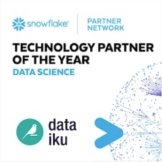More than ever, the global health crisis of 2020 has illustrated the need for telecommunications companies to lean into Everyday AI, bringing data science, machine learning, and AI out of the realm of experimentation and into the day-to-day operations of the business. With increased demand, use cases like monitoring network usage, building 360 degree customer knowledge, and ensuring network resiliency are more important than ever, while concerns about customer retention and — like all industries — agility in forecasting come to the forefront.
Orange, one of the largest operators of mobile and internet services in Europe and Africa and a global leader in corporate telecommunication services, has been working to ramp up its efforts in data science and machine learning for the past several years, increasing its capacity to leverage data in all areas of the business. By choosing the right technology and empowering more and more people to work with data (both via hiring and upskilling), Orange has been able to overcome the challenges of being a non-digital native business to improve the overall level of data competency at the organization.
Challenges
The client services department at Orange has a data science team which, until two years ago, was performing mostly ad-hoc analysis for the business and had limited ability to work on more complex machine learning-based projects. In order to scale out the team and expand their scope, they had to overcome several challenges:
- Tooling: Only those who knew the tool and its proprietary language could work with data, which limited the use of data to statisticians or data scientists. Even then, the data was difficult to access,making projects difficult to get off the ground. At the same time, the tool was geared toward BI and wasn’t capable of supporting machine learning-based data projects.
- Hiring: The data team at Orange was struggling to hire talented data scientists fresh out of university and with lots of ambition as well as creative ideas (traits they were seeking to enliven their data science practice). Unfortunately, this was largely a function of the tooling challenge, as young data scientists were largely looking for jobs where they could work with open-source tools (such as Python or R). Anyone they did bring on board had to learn the legacy tool and took months to get up to speed and start being productive.
It’s worth noting that these challenges are not unique to Orange — they likely sound familiar to any telecommunications or even non-digital native business looking to pivot and develop a more robust data practice. How did the data team at Orange overcome them?





